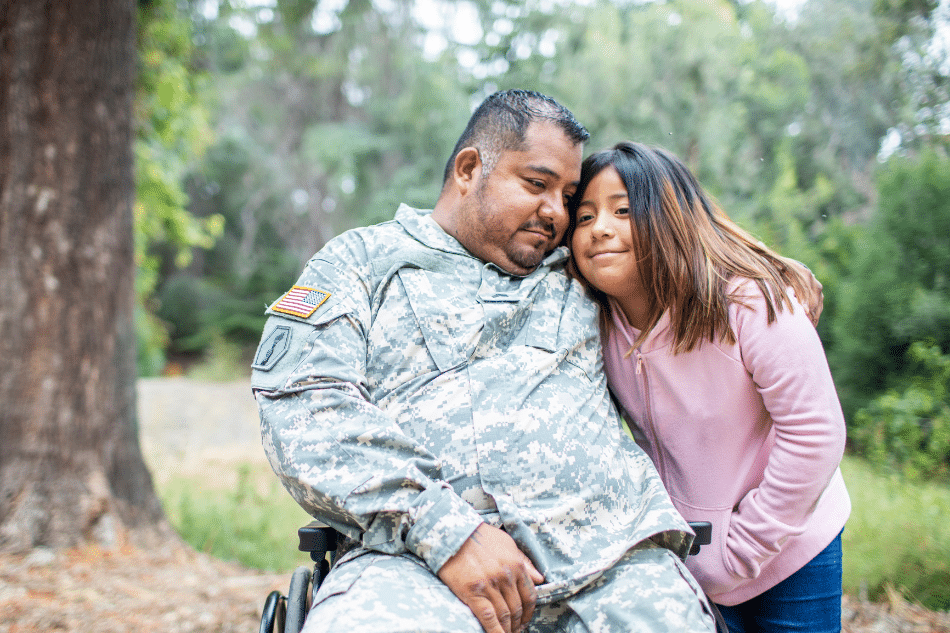Family Counseling for Military Households: How It Helps Teen Wellness

Over half of military members out on active duty have families, and nearly a quarter of their kids are teens.1 Raising teens is tough for anyone, but military life adds extra layers of stress, from frequent moves to long deployments. It’s a lot for any family to handle.
Seeking support in moments of difficulty or strain through family counseling is nothing to be ashamed of. In fact, it can help you get back to where you want your family to be.
Fortunately, there are many services dedicated to supporting military families in this way because the challenges you face are known to be extremely difficult. To help you find the support you need, this page will explore:
- Why some military families need counseling
- Why mental health for military teens can be improved by it
- How family counseling helps military families
- How to get the most out of your counseling sessions
- How to access family therapy, with and without military services
Let’s dive in!

Why Might Military Families Need Therapy?
As you know, military families might move every 2 to 4 years, with children experiencing relocation, on average, 9 times by the age of 18.1 Relocation is just one of the many stresses of military life. Military families tend to face a variety of challenges including extended separations, significant disruptions to routine, and perhaps even difficulties with parenting due to trauma and mental health issues. On top of this, you have to adapt to risk, injury, and sometimes death.3
These issues are not to be underestimated. And it isn’t surprising that mental health for military teens, and military families overall, can suffer as a result of these experiences.
Young people who are in some way connected to the military are more likely to report persistent feelings of hopelessness, emotional problems, low well-being, and decreased life satisfaction. They are also more likely to take part in risky behaviors. What’s more, 1 in 4 military children will experience an emotional-behavioral challenge associated with deployment.2,1
As a result of the impact of military life on each individual, family relationships can also suffer (both between parent-child and marital partners). If your family is struggling with the impact of your teen’s mental health or the relationships within your family seem to be breaking down, it might be necessary for the whole family unit to be treated, sometimes together.
That’s why family counseling for military families is a great option. A teenager’s distress isn’t happening in a vacuum – their feelings are connected to what’s happening in the family and around them, often reflecting a family’s dynamics. By including the whole family in the healing process, counseling can discover and address unhelpful elements and make the home more supportive for everyone in it.
What Is ‘Military Family Syndrome’?
When thinking about how your family is impacted by military life, you might have come across the term ‘military family syndrome’ and wondered if it applies to your situation.
This term was coined after the Vietnam War and refers to the mental health issues children can suffer as a result of a parent being deployed. While this isn’t an official psychiatric classification, it does give us an idea of the very real impacts military life can have on the family system.4
And while every family is different, you might recognize some of these commonly reported issues:
- Anxiousness for the safety of the deployed parent
- The stress of the parent left behind as the primary caretaker
- Older children shouldering extra responsibilities4
Military family syndrome may also refer to the way that children of deployed parents are more at risk of struggling with anxiety, depression, aggression, and behavioral issues.4
But while it’s important to know these terms, it’s not recommended that you get hung up on a label like this. ‘Military family syndrome’ is an oversimplification of situations that can be extremely complex. In addition, it might make your family’s completely normal way of adapting to extreme stress sound abnormal or unhealthy.
A person-centered (rather than generic or labeling) approach will be much more helpful as it makes space for the unique experiences and circumstances in your family without imposing labels.
How Can Therapy Help Military Families?
Family counseling for military families can help in several ways. Military household therapy services are going to provide a supportive space for everyone in your family to express their feelings, fears, needs, and grievances. The therapist will facilitate this without letting things escalate into an unhelpful space. They’ll keep you on track to focus so that everyone’s feelings can be voiced.
Some therapy services will be knowledgeable about military life, such as Military OneSource or the MFLC program. Speaking to a professional like this may be extremely relieving as you won’t have to explain the ins and outs of military life that are second nature to you.
Over time, the therapeutic space can encourage past traumas and conflicts to gently surface in a safe way. Your family will have been through a lot, but we don’t always linger on difficult experiences for long enough to process and heal from them. A family therapist may bring these traumas into the light so that they can be addressed. Some people like that they can do this in a space away from their ‘normal’ life, as it’s contained and supported by a professional.
Family therapists won’t just work in the past, but they’ll equip you for the future. They should demonstrate how you can de-escalate future conflicts, listen to each other with empathy, and resolve disagreements constructively. By improving family dynamics, military life will be much easier to navigate after therapy.
When you partake in parent-teen therapy, military families can experience a significant reduction in the amount of conflict between family members. Let’s explore that in more detail:
How Will Counseling for Military Families Help Teen Wellness?
Family therapy can be useful for the whole family system, including the well-being of your teen. The benefits of therapy for military teens include:
- Improving communication between you
- Repairing historical rifts
- Reducing misunderstandings
- Improving their ability to express emotions in a constructive way
- Helping them to feel less alone with what they’re going through
- Understanding their reasons for acting out, taking risks, or being aggressive
- Improving their ability to regulate emotions in the future
Family therapy is an effective way to move towards these amazing results. If you’re ready to take the leap, we’ll now explore what you can expect from the experience and how to make the most of it:
Getting the Most Out of Family Therapy
Now you know how counseling helps military kids, it’s time to prepare yourself for the experience of therapy. And here’s the truth: Family counseling for military families won’t always be easy. You can expect some difficult and painful moments to come up and for life to feel a bit different than it usually does while you’re attending sessions. This is completely normal. You might want to carve out time before and after counseling sessions where the family can ‘cool off’ and let things settle.
Conflict resolution for military families might involve reliving painful moments from the past, taking it in turns to listen to each other, taking accountability for mistakes, committing to doing things differently, owning your own motivations and feelings, and investigating patterns of behavior. You might be dealing with really big stuff in therapy; give your family grace in not handling it perfectly, these things take time.
Before starting your course of therapy, speak as a whole family about the process. Your children should know what they can expect too. Reassure them that they’re not in trouble and that the sessions are for everyone, including them, to express how they feel openly.
For yourself, you should expect to hear some difficult things. It’s important that you go in with an open frame of mind, ready to be curious about yourself, your partner, and your children. It’s natural for defensiveness to come up in counseling, but this is something to work through instead of stubbornly maintaining. You can get the most out of therapy by being honest with yourself about what’s been difficult for you and asking for the therapist’s help in integrating what you’re learning.
Once you’re having the sessions, it’s best if you’re consistent with them and that you engage with the therapist’s recommendations. You might have a limited number of sessions but do ask for more if you need to. Remember that healing isn’t something that can be forced; it takes as long as it takes.
How to Get Therapy as a Military Family
There are a few ways you can get therapy as a military family. If you want to get family therapy through TRICARE, it usually has to be at a military hospital or clinic if possible. To get authorized TRICARE family counseling from a civilian provider, you’ll need to get a referral.
You might choose to get family therapy from Military OneSource, which runs the Military and Family Life Counseling (MFLC) program. This is free counseling for service members and their families. It’s confidential, and nothing you say could impact a service member’s security clearance or be reported to the command.
You can also get family therapy outside of military-provided services, if you want to, from a private counseling service. Do as much research as you need to ensure you find a therapist you’re comfortable with. Don’t forget that if it doesn’t work out with your first family therapist, you can always choose to work with someone different.

Get Family Therapy Today
We understand you might want to seek counseling for your family outside of military providers. Here at Mission Prep, we offer therapy that facilitates healing between all members of your family by improving communication, resolving conflicts, and strengthening relationships for the future.
Alongside offering family counseling for military families, we specialize in treating teenagers who are struggling with their mental health. Our licensed professionals have experience treating teenagers with anxiety, depression, PTSD, bipolar disorder, ADHD, anger, self-harm, and schizophrenia.
When you come to Mission Prep for help as a family, you and your teenager will be in safe hands. Call us today to book a free consultation.
References
- Huebner, C. R. (2018). Health and Mental Health Needs of Children in US Military Families. Pediatrics, 143(1), e20183258. https://doi.org/10.1542/peds.2018-3258
- Mahar, A. L., Cramm, H., King, M., King, N., Craig, W. M., Elgar, F. J., & Pickett, W. (2023). A cross-sectional study of mental health and well-being among youth in military-connected families. Health Promotion and Chronic Disease Prevention in Canada : Research, Policy and Practice, 43(6), 290–298. https://doi.org/10.24095/hpcdp.43.6.03
- Paley, B., Lester, P., & Mogil, C. (2013). Family Systems and Ecological Perspectives on the Impact of Deployment on Military Families. Clinical Child and Family Psychology Review, 16(3), 245–265. https://doi.org/10.1007/s10567-013-0138-y
- Surabhi, Yadav, A. K., Prakash, J., & Mukherjee, R. (2021). Do children separated from fathers have higher anxiety levels? A comparative analysis. Medical Journal Armed Forces India. https://doi.org/10.1016/j.mjafi.2021.06.005













